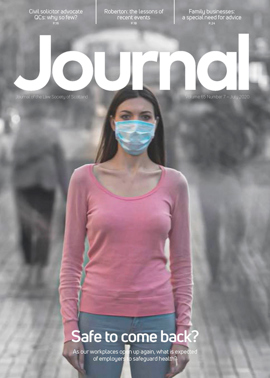Society research measures COVID impact

The economic impact of the COVID-19 pandemic right across the solicitor profession has been laid bare by research carried out by the Law Society of Scotland.
Based on a telephone survey of a representative sample of 158 firms, the Society estimates that 35% of employed solicitors in private practice – around 1,627 out of 4,650 – have been furloughed, along with 41% of non-solicitor staff (4,720 out of 11,500).
About 90% of firms have experienced reduced turnover, rising to 100% in the case of large firms, with a similar percentage reporting a fall in new business (here, smaller practices were closer to the 100% mark) and more than 80% reduced cash flow. Late or non-payment by clients was somewhat less of a problem, though the average of below 40% was doubled in the case of the largest firms (30 partners or more).
In response:
- nearly 60% of firms overall have introduced a recruitment freeze (but 100% of large firms), and 40% a promotion freeze (more common in small firms);
- fewer than 20% have imposed salary reductions, though this is considerably more likely with larger practices;
- partner drawings have been reduced in 60-80% of firms across the board;
- more than half have imposed hours reductions, though this varies considerably with size of firm.
Firms employing trainees tended to treat them in the same way as other staff, though some were more likely to furlough their trainees.
As for practice sectors, court and chamber work were, unsurprisingly, both significantly affected, but the impact on an employment law practice was much less.
Firms have readily taken up central and local government grants offered as support measures, but only a minority have applied for VAT or other tax deferral or rates relief – many taking the view that it was better to meet these liabilities sooner rather than later.
However, the impact of business charges can be seen in the responses to the question on rating the potential impact of the SLCC levy, with almost 70% overall stating that their firm was either “concerned” or “extremely concerned” at this.






